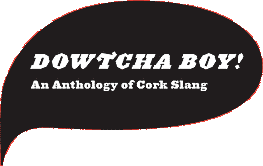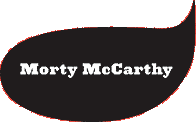Welcome...
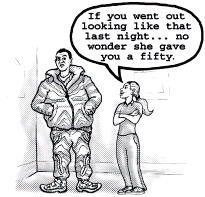 ...to
the world of Cork – a world where pigs’ feet and sheeps’ stomachs are part
of the staple diet. People play all sorts of strange card games. The train station is built on a bend.
Adults buy their reading glasses in novelty shops. People drink rasa and Tanora. The population is
forever 136,000. All sorts of unusual feast days are celebrated (Bonfire Night, Corpus Christi, Women’s
Little Christmas). A place where traditional sports such as rings, draghunting and road bowling are
still hugely popular. In short, Cork is a unique city. Every place is unique, of course. This book,
however, is a celebration of Cork’s uniqueness and more particularly a celebration of its language.
...to
the world of Cork – a world where pigs’ feet and sheeps’ stomachs are part
of the staple diet. People play all sorts of strange card games. The train station is built on a bend.
Adults buy their reading glasses in novelty shops. People drink rasa and Tanora. The population is
forever 136,000. All sorts of unusual feast days are celebrated (Bonfire Night, Corpus Christi, Women’s
Little Christmas). A place where traditional sports such as rings, draghunting and road bowling are
still hugely popular. In short, Cork is a unique city. Every place is unique, of course. This book,
however, is a celebration of Cork’s uniqueness and more particularly a celebration of its language.
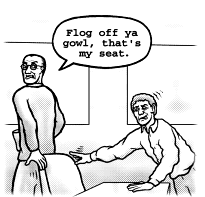 Cork is the second
city of Ireland, situated near the south coast. It's a city that has never suffered from ‘second
city syndrome’ because its citizens firmly believe it to be ‘De Real Capital’. It
is built on rolling hills and the accent rises and falls in imitation of the landscape. There are a
bewildering variety of accents within the city itself. Cork people love to talk and are extremely skilled
in their use of language.
Cork is the second
city of Ireland, situated near the south coast. It's a city that has never suffered from ‘second
city syndrome’ because its citizens firmly believe it to be ‘De Real Capital’. It
is built on rolling hills and the accent rises and falls in imitation of the landscape. There are a
bewildering variety of accents within the city itself. Cork people love to talk and are extremely skilled
in their use of language.
In a way, I have been writing this book all my life. Many of the words gathered are part of my own vocabulary. I picked up the new and unfamiliar words by simply listening to the people of Cork speak. You won’t find a lot of these words in books. New words are constantly coming into our vocabulary, just as old ones disappear. So in a way this will always be an unfinished book. It’s impossible to draw a line in the sand and say that all the words we use have been ‘found’. I am certain that there are many words out there that have escaped my attention.
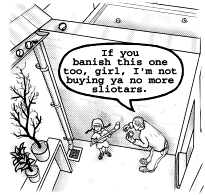 It is important to keep
a record of our language. It tells us a lot about who we are. Cork is a city rich in character and
deserves to be recorded as such.
It is important to keep
a record of our language. It tells us a lot about who we are. Cork is a city rich in character and
deserves to be recorded as such.
One of the most remarkable things I discovered whilst writing this book was the large difference in the language used in various parts of the city. For example, almost everyone on the northside I spoke to knew what the term ‘strawkhauling’ meant whereas most southsiders looked at me blankly.
On the other hand a word such as ‘rcyc’ would be common knowledge in Douglas though relatively unknown in other parts. Many people in the more affluent areas of the city seem to be unaware that ‘rasa’ is a traditional Cork drink at Christmas. Everyone has their own version of what Cork is.
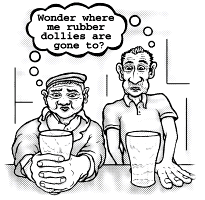 With regard to
the words themselves I have spelt them as they sound. There is a great deal of difference between the
spoken and written language and I have tried to capture the feeling of the spoken word in Cork.
With regard to
the words themselves I have spelt them as they sound. There is a great deal of difference between the
spoken and written language and I have tried to capture the feeling of the spoken word in Cork.
I hope you get as much enjoyment from reading this book as I did from writing it.
Up the rebels,
Morty
